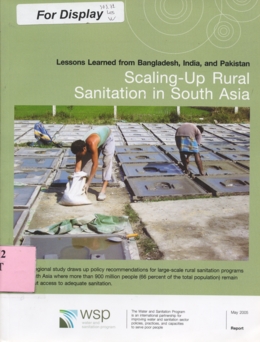Kategori Digilib
Lessons Learned From Bangladesh, India, and Pakistan: Scaling Up Rural Sanitation in South Asia.

Penerbit
New Delhi, Water and Sanitation Program (WSP), 2005, 132 hal
New Delhi, Water and Sanitation Program (WSP), 2005, 132 hal
Tahun Terbit
2005
2005
No. Klasifikasi
363. 72 WAT l
363. 72 WAT l
Kata Kunci
Rural Sanitation, South Asia
Rural Sanitation, South Asia
Lokasi
Perpustakaan AMPL
Perpustakaan AMPL
Dilihat
965 kali
965 kali
In South Asia, more than 900 million people (66% of the total population) remain without access to adequate sanitation. Despite significant investments, rural sanitation caoverage in the region is barely keeping pace with population growth. Clearly, current approaches to the development and provision of rural sanitation services in the region are either not effective, or are not at suffficient scale to make an impact on the enormous population that lacks adequate sanitation.
This regioanl study was commissioned by the water and sanitation Program South Asia (WSP - AS) to adress some of these issues. The main objectives of the study were: to develop case studies of innovative approaches to rural sanitation in Sputh Asia; To analyse the factor of success (and constraints) found in these case studies; To aseess potential strategies (and constraints) to scalin gup the approaches used in case studies; and To draw up policy recommendations for large - scale rural sanitation programs in the region.
This regioanl study was commissioned by the water and sanitation Program South Asia (WSP - AS) to adress some of these issues. The main objectives of the study were: to develop case studies of innovative approaches to rural sanitation in Sputh Asia; To analyse the factor of success (and constraints) found in these case studies; To aseess potential strategies (and constraints) to scalin gup the approaches used in case studies; and To draw up policy recommendations for large - scale rural sanitation programs in the region.
